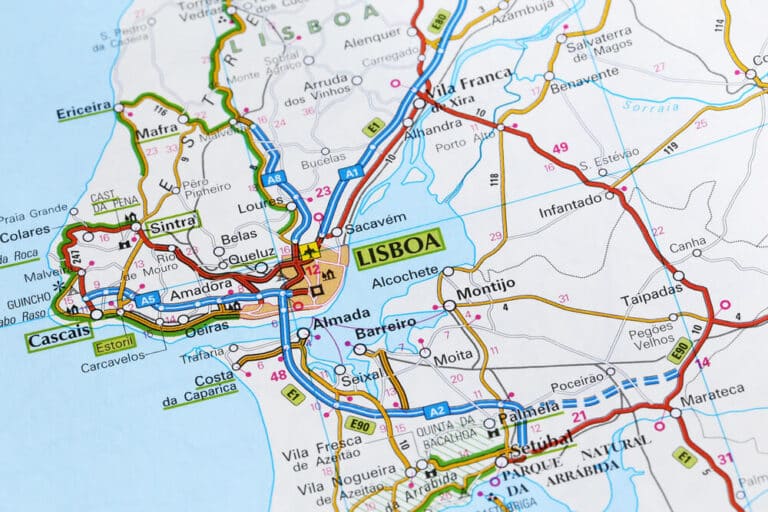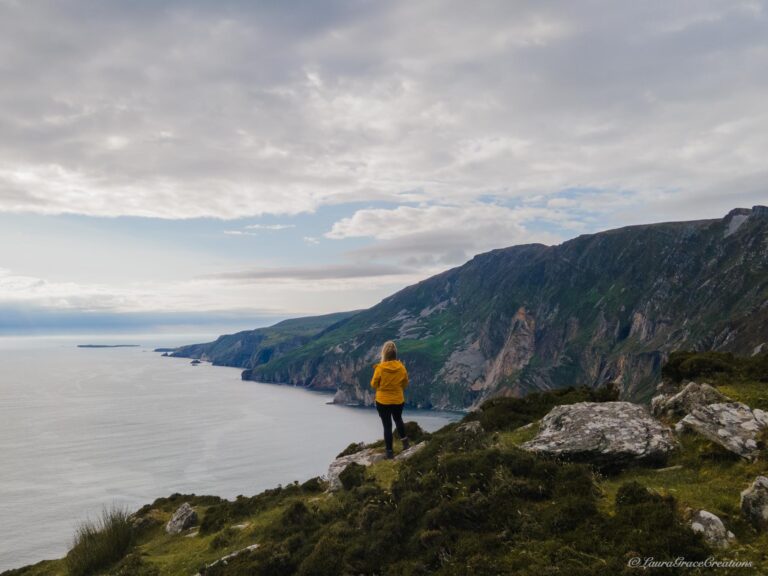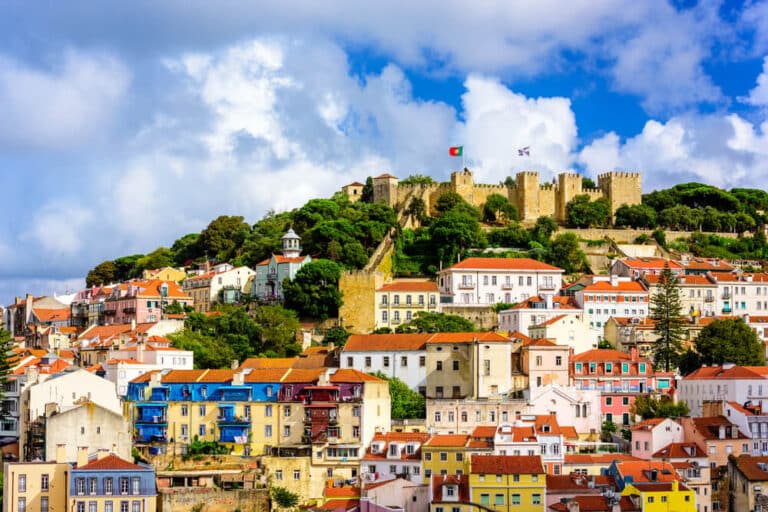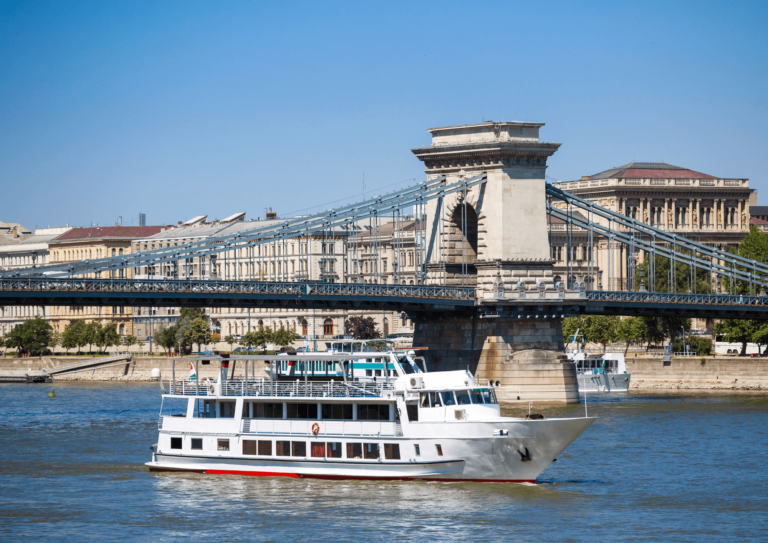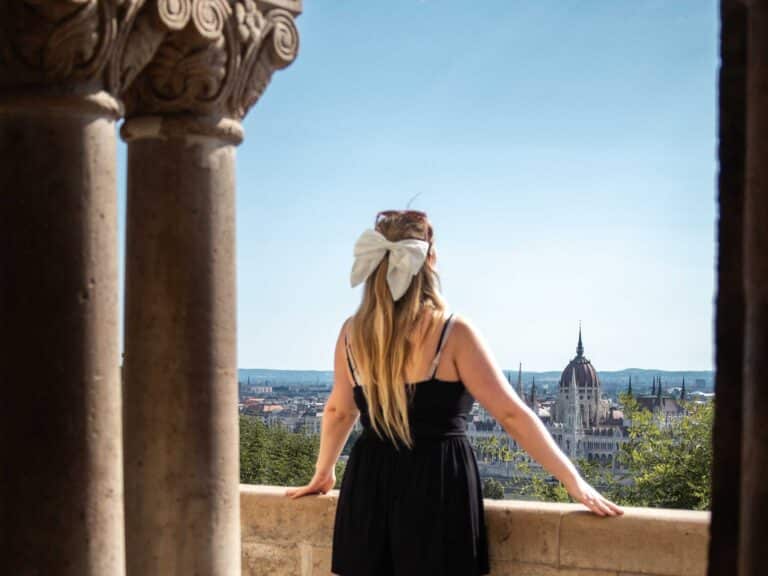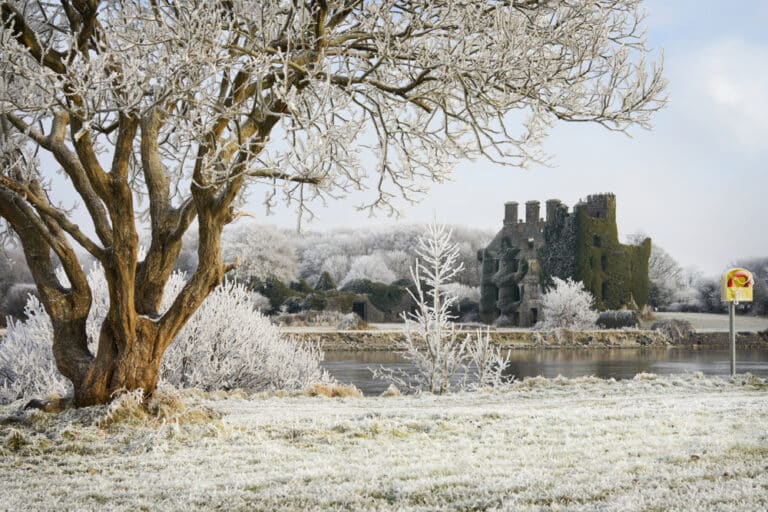Does it snow in Portugal? What to Expect from a Portuguese Winter!
You may have found yourself wondering, ‘Does it snow in Portugal?’ before planning your trip in the off-season. Well, luckily, you are in the right place to find out.
While Portugal does have a Mediterranean climate, that does not mean the country does not experience some snowfall during the winter months. So, in this post, we are going to take a look at some places where you can expect it to be particularly cold in Portugal and some that have a more milder climate.
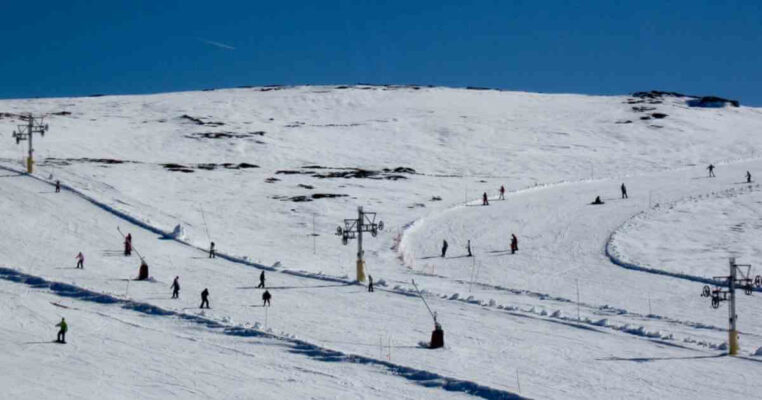
Section 1: Regions that get Snow in Portugal
Let’s kick off this post by having a look at some of the regions where you may expect to see some snowfall in Portugal.
Does it snow in Portugal?
So, if you are here for the short answer, then yes, it does snow in Portugal. However, the chances of actually seeing snow on your trip all comes down to the region you plan to visit. Some parts of the country are more likely to experience snowfall than others. Let’s take a look at these spots!
Where does it snow in Portugal?
The most likely place to encounter snow in Portugal is in the Northern Regions, here you will find the country’s highest peaks and mountainous terrain. This is a popular spot for hiking, skiing, and other winter sports. Now, I must admit, you will not find snow in Portugal that compares to the likes of other European countries such as Italy or Switzerland, but it can still be quite a magical experience.
Some of the places where you might catch a glimpse of snow in Portugal are:
📍Serra da Estrela
Serra da Estrela is home to the highest mountain range on mainland Portugal, reaching 1,9 metres at it’s highest point. In the winter, the area often sees a blanket of fresh snow, meaning it is the only place in the country to experience consistent snowfall.
Portugal’s only ski resort is located in Serra da Estrela. Now, it by no means lives up to the likes of other ski resorts around Europe, but if you are a beginner or just looking to have some fun in the snow, it is definitely worth checking out.
If you do plan to visit Serra da Estrela, then it is important to note that the region is renowned for its cheese and wool products. As well as being the birthplace of the Serra da Estrela dog breed, which is native to Portugal.
📍Serra do Gerês
Another place in Portugal you may find snow in Serra do Gerês, particularly in the winter months. This is another mountainous region in the North of Portugal, and while snowfall is less predicable here it does happen from time to time.
It is common to see snow hug the regions peaks, making a nice picturesque backdrop for photos and winter hikes.
Aside from being a area for potential for snowfall, Serra do Gerês is also a popular spot for nature lovers due to its National Park. Here you will find stunning waterfalls, lagoons, and hiking trails that showcase the unique side to Portugals landscapes.
📍Serra de Montemuro
Again situated in Northern Portugal, is Serra de Montemuro, another tranquil spot for nature lover, although not as popular as the Serra da Estrela region.
This area also occasionally gets covered in a charming white coat of snow. Which really adapts the region into a winter wonderland, perfect for those looking to escape the city and immerse themselves in nature.
How much snow does Portugal get?
So, as mentioned above, the only place to experience regular snowfall in Portugal is the Serra da Estrela region. However, even at that the snow there can be quite unpredictable.
If you are just visiting for a short period of time, then your best bet is to check the weather forecast before heading up there. The Snow Forcast is a great site for checking conditions and live webcams of the ski resort.
When does it snow in Portugal?
The mostly likely time to see snowfall in Portugal is in the winter months, from December to February.
However, with that being said Serra da Estrela has seen snowfall as early as November and as late as March.
So if you are planning a trip specifically for the snow, keep an eye out on weather forecasts closer to your travel dates.
In addition, some years may have more consistent or heavy snowfall than others. It’s best to do some research beforehand to get an idea of what to expect for your chosen time of year.
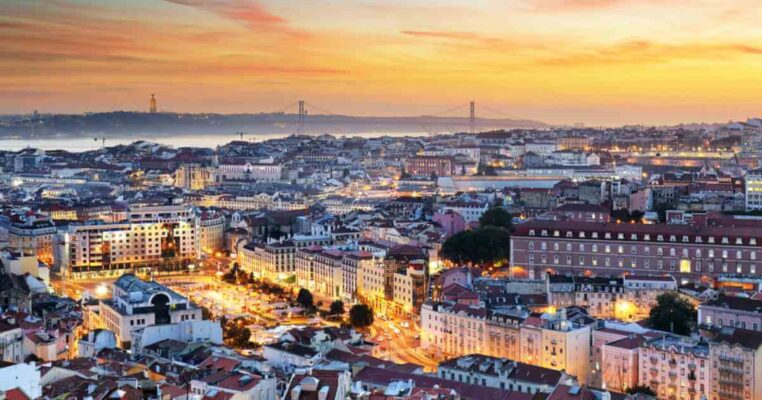
Section 2: Weather in Portugal in the Winter Months
Ok, so now that we have discussed places it snows in Portugal let’s take a look at the kind of weather you can expect in other regions of Portugal in the winter months.
Typical Weather in Portugal in the Winter Time
Excluding the northern mountain regions of Portugal, the country typically see’s rather mild temperatures in the winter months. It is a popular spot for tourism throughout the year, thanks to it’s Mediterranean climate.
Winter typically spans from December through February, with temperatures averaging between 10 to 15 degrees Celsius (50 to 59 degrees Fahrenheit) during the day in areas such as Lisbon and Porto.
In these regions tempetures can drop as low as 5 and 8 degrees Celsius (41 and 46 degrees Fahrenheit) at night time, making it a pleasant climate for exploring the cities during the day while still needing a jacket or coat in the evenings.
Rainfall During the Winter Months
During the winter months, rainfall in Portugal is quite frequent, especially in the northern regions, including cities like Porto.
December typically sees the highest amount of rainfall, with an average of 120 mm. While the southern regions, such as the Algarve, are drier, but they still experience occasional showers.
Despite this, the rain seldom disrupts daily activities and often clears up quickly, leaving behind clear skies and fresh air. So, this again leads to Portugals appeal for tourist in the off season.
The Chilliest Month in Portugal
In Portugal, January is usually the coldest month. This is especially true when you consider how mild the weather is the rest of the year.
It is usually between 8 and 15 degrees Celsius (46 and 59 degrees Fahrenheit) this month.
It does happen sometimes, though, especially at night, for the temperature to drop a bit.
January is the coldest month, but compared to many other European countries in the winter, the weather is still pretty mild in most places.
Section 3: Getting Around Portugal in Snow/Winter Time
Ok, so now that we have cleared things up, the only place you really need to worry about snow in Portugal is in the high up Northern Area’s. So, if you are planning a trip in the winter months getting around is still relatively easy, even if you did encounter the occasional snowfall.
Public Transportation
Portugal has a well-developed public transportation system that includes buses, trains, and subways. These are all reliable methods of getting around the country during winter.
However, times may vary, due to seasonal changes, darker nights and shorter days.
In some smaller towns, buses may not run as frequently as they do during peak seasons, but overall the public transportation system remains functional and convenient for travellers.
Taxi’s & Uber
If you are planning to visit the big cities such as Lisbon or Porto during the winter, taxi’s and Uber are also available options for getting around.
While, this will be more expensive than walking or using public transport it is a great way of getting somewhere quickly when you dont have the summer sun to warm you up.
Renting a Car
Renting a car is also an option during winter in Portugal.
This is a good option for those looking to go on a road trip or explore the countryside as you will have the freedom to stop wherever and whenever you please.
Also, don’t let the chance of snowfall in the high regions in the north deter you, as there are plenty of places to see. You will just need to check the forecast and take extra precautions if snow occurs.
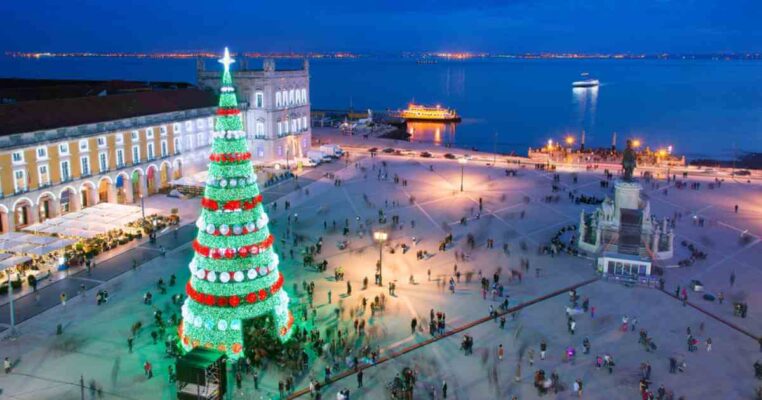
Section 4: Things to do in Portugal in the Winter Months
There is some many wonderful places to visit in Portugal in the winter month. As this is the off season, it is almost guaranteed you will have some of the countries most famous landmarks all to your self.
Visit Festivals and Events
A lot of events and festivals happen in Portugal in the winter.
The holiday season starts in November, when every city and town has chestnut festivals and Christmas markets.
The “Feira de Natal” (Lisbon’s Christmas markets) happen every year and sell a wide range of items, from crafts to food.
People celebrate the start of the new year with amazing fireworks shows. In Madeira, one of the biggest fireworks shows in the world takes place.
Also, don’t miss the “Festa das Chouricas” in January. It’s a celebration of Portuguese smoked sausage, and you can eat delicious food from the area.
Another great time to experience Portugal’s rich culture is in the winter, when many concerts, plays, and art shows happen, like the “Lisbon & Sintra Film Festival” and the “International Chocolate Festival” in Óbidos.
Explore the Natural Beauty
Winter in Portugal is an excellent time to explore the country’s natural beauty. There is far less crowds about yet the tempetures remain mild in most places.
Consider visiting the stunning landscapes of the Douro Valley, with its vineyard-covered hillsides, provide a breathtaking backdrop for a winter walk.
The Algarve’s coastline which is usually a summertime destination, offers an entirely different experience in winter with its dramatic, storm-weathered cliffs and deserted beaches.
Or head to the Azores, a group of volcanic islands in the Atlantic Ocean, where you can hike through lush green forests, swim in hot springs and observe whales and dolphins in their natural habitat.
Enjoy Winter Sports
As we mentioned earlier in this post, the Serra da Estrela region is a popular spot for those who love winder sports, offering a range of activites including skiing, snowboarding, and sledding.
The region itself is beautiful during winter, with snow-covered peaks and picturesque villages some notable places include Covilhã, Manteigas and Seia.
Wine Tasting
Portugal is famous for its wine, and winter can be a fantastic time for a wine-tasting tour. Visit Porto, the city known for its fortified wine, and indulge in a Port wine tasting experience.
There is also a various amount of wineries in the Douro Valley, where you can sample some of the best wines Portugal has to offer.
Explore Historical Sites
Winter is a great time to visit Portugal’s historical sites without the usual tourist crowds. Explore the UNESCO World Heritage Sites like the Jerónimos Monastery in Lisbon or the historic city of Évora without feeling rushed.
Also, consider visiting the medieval town of Óbidos, with its charming streets and castle walls covered in Christmas lights during winter.
Section 5: Packing for Portugal in Winter
Now, I want to mention a few packing must haves for you winter trip to Portugal. I have dived this section in two, a packing guide for the milder parts of the country and for places that may experience some snow.
What to pack for Portugals milder area’s in the Winter
For Portugal’s milder areas, think layers.
Temperatures during the day can be quite comfortable, but evenings often see a significant drop. Begin with a base layer of lightweight, breathable clothing. Add a medium layer like a fleece or light sweater for additional warmth as needed.
Lastly, I’d pack a waterproof and wind-resistant outer layer. You never know when it may rain and it is much more likely too throughout these months.
Oh! And suncream is still very much needed. The sun can be quite strong in Portugal and the last thing you want is to get skin damage.
What to pack for Portugals Mountain Area’s in Winter
For Portugal’s mountainous regions in winter, more substantial clothing is required.
Daytime temperatures can be surprisingly chilly, and snow is possible at higher grounds. Start with thermal base layers to keep the cold at bay. Add a heavier sweater or fleece as a middle layer for added insulation.
Your outer layer should be a waterproof, windproof, and insulated jacket. Good quality gloves, a warm hat, and thermal socks are also essentials in these areas. Don’t forget sturdy, waterproof footwear suitable for potentially icy conditions.
And again, just because it is colder here does not mean you should skip the suncream.
What time does it get dark in the Winter Months in Portugal?
During the winter months in Portugal, daylight hours are considerably shorter. The sun typically sets between 5:00 PM and 6:00 PM, depending on your location and the specific time of winter.
The shortest day of the year, December 21st, sees the sun set as early as 5:00 PM. This is something to be mindful of when planning your trip as a lot of itineraries online feature timetables best suited for the summer months.
Should I visit Portugal in the Winter?
Absolutely! Visiting Portugal in winter can be a magical experience. Even though it’s a little cooler and the days are shorter, there’s something special about winter in Portugal.
The streets are less busy, there are more Christmas decorations and markets, and everyone feels warm and welcome. As an added bonus, you can visit Portugal without all the tourists that come during the summer.Winter is also a great time to go because prices for activities and places to stay are lower.
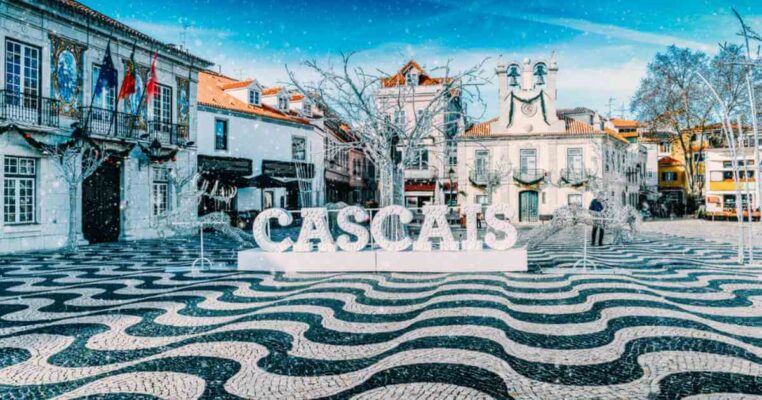
Does it snow in Portugal? FAQ
Ok, so let’s finish this post with some question we did not cover in the blog so far. These are things people often ask before planning a winter trip to Portugal.
What is the snowiest city in Portugal?
The snowiest city in Portugal is arguably Guarda, located in the Serra da Estrela region. Known as the highest city in Portugal, Guarda often experiences it’s fair share of snowfall during the winter months, especially in January and February.
The town sits at an elevation of 1,056 meters which explains the colder weather and snow cover. It is also very pretty in the winter months .
Can I go skiing in Portugal?
Yes, you can! As mentioned before, Serra da Estrela is the highest mountain range in Portugal and it’s also home to a ski resort. The resort, offers a variety of slopes for all levels and even has night skiing options. It’s a great option for ski lovers looking to experience winter in Portugal.
Is Serra da Estrela good for skiing?
Yes, the resort is a good place to go skiing. While it is nothing compared to the giants in the alps, it is certainly a great spot for beginners to learn and intermediate/advanced skiers to practise.
Does it ever snow in Lisbon?
Snow in Lisbon is a very rare event due to its the cities location and Mediterranean climate. However, that does not mean it is not a great city to explore in the winter months.
Here are some pro’s to visiting Lisbon in the Winter:
It is more affordable: The city is rather affordable in the off-season; you will find it has a lot less crowds.
The mild climate: Lisbon is not that cold durning the winter months, with temperatures averaging at around 10°C (50°F). This makes it a great destination for those who want to escape harsh winter weather.
Christmas markets and festivals: Like most European cities, Lisbon also has its own Christmas market and festive celebrations. You can indulge in traditional Portuguese treats and do some Christmas shopping while enjoying the festive atmosphere.
It’s safer: Lisbon by no means is a unsafe city. However, you are less likely to encounter petty crimes such as pickpocketing at this time of year as there are less people about.
Are there any winter activities in Lisbon?
While snow activities may not be available in Lisbon, there are plenty of other winter activities to enjoy.
Here are some popular winter activities in Lisbon:
Explore the city’s Christmas lights: The entire city is lit up with beautiful holiday decorations which create a magical atmosphere to explore.
Go ice skating at the outdoor rink: Located in the Parque Eduardo VII, this open-air ice rink is a fun activity for both children and adults.
Visit a traditional Portuguese bakery: Warm up with a cup of hot chocolate and indulge in some delicious pastries at one of Lisbon’s many bakeries.
Attend a Fado concert: Fado is a traditional Portuguese music style that is best experienced in the winter months. You can find many concerts and performances throughout the city during this time.
Take a day trip to Sintra Or Cascais. Just a short train ride away, Sintra is a stunning town with fairytale-like castles and beautiful scenery that is even more magical in the winter.
You could also consider visiting the nearby town of Cascais, which holds yearly Christmas celebrations. There is also plenty of things to do in Cascais in the winter as it tends to have pretty mild tempetures all year round.
Enjoy a cozy evening at a wine bar: Lisbon has many charming wine bars where you can enjoy a glass of Portuguese wine by the fireplace.
Does they get snow in Porto?
Snowfall in Porto is extremely rare due to its mild oceanic climate.
The city enjoys mild winters, with average temperatures usually remaining above freezing. However, the surrounding mountainous regions may witness occasional snowfall.
Despite the absence of a traditional winter wonderland, Porto offers its unique charm during the winter months with fewer crowds, decorated streets, and cozy cafes inviting visitors to taste the renowned Port wine.
Does it snow in Madeira?
Snow is very unlikely in Madeira, given its subtropical climate. The island maintains a warm climate year-round, making it a popular winter escape.
However, during the cooler months, the high peaks of the island, such as Pico do Arieiro and Pico Ruivo, may occasionally receive a dusting of snow. However, this is just a dusting and a very rare occurrence.
Does Azores get snow?
Much like Madeira, snow in the Azores is a rare occurrence but not entirely impossible. Due to their location in the Atlantic Ocean, the islands enjoy a mild climate all year.
Does it snow in the Algarve?
Again, it is very unlikely to see snow in the Algarve, this is due to its location along the southern coast of Portugal, where temperatures remain mild and pleasant throughout the winter months.
It can be a good place to visit for those looking yo escape colder winter climates, but if you are hoping for some snow activities, the Algarve may not be the best destination.
Where is the hottest place to visit in Portugal in the winter months?
The Algarve is in fact the hottest place to visit in Portugal during the winter months. Temperatures here often reach up to 18°C during the daytime, providing a comfortable climate for exploring the region’s picturesque towns, stunning beaches, and historic sites.
In the evenings can be a bit chillier, so bringing a light jacket might be a good idea.
When was the last time Portugal had snow?
The last significant snowfall in Portugal occurred in 2006, with even the capital Lisbon receiving a light dusting. However, on this occasion the snow only lasted a few hours before melting away.
